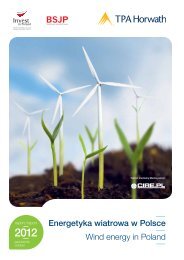Energetyka wiatrowa w Polsce Wind energy in Poland - TPA Horwath
Energetyka wiatrowa w Polsce Wind energy in Poland - TPA Horwath
Energetyka wiatrowa w Polsce Wind energy in Poland - TPA Horwath
Create successful ePaper yourself
Turn your PDF publications into a flip-book with our unique Google optimized e-Paper software.
7.2<br />
30<br />
pośrednio ustalane poprzez wysokość opłaty zastępczej,<br />
corocznie waloryzowanej wskaźnikiem cen<br />
towarów i usług konsumpcyjnych ogłaszanym przez<br />
GUS. W odróżnieniu od obowiązującego w wielu<br />
krajach Unii Europejskiej systemu tzw. feed-<strong>in</strong>-tarrifs,<br />
wysokość wsparcia opartego na systemie zbywalnych<br />
świadectw pochodzenia jest mniej przewidywalna,<br />
ponieważ opiera się na grze popytu i podaży.<br />
Projekt Ustawy OZE – wersja 2.0.1<br />
Draft of the Act on Renewable Energy Sources<br />
(RES) – version 2.0.1<br />
W efekcie trwających nadal prac legislacyjnych nad<br />
Ustawą OZE, M<strong>in</strong>isterstwo Gospodarki 4 października<br />
2012 roku opublikowało kolejny, trzeci projekt Ustawy<br />
OZE (wersja 2.0.1). Zgodnie z oficjalnym stanowiskiem<br />
M<strong>in</strong>isterstwa Gospodarki prace legislacyjne<br />
nad ustawą OZE zostały na szczeblu resortowym<br />
ostatecznie zakończone. Ustawa OZE, pomimo<br />
postulatów branżowych, będzie implementowana<br />
w ramach tzw. „trójpaku energetycznego” łącznie<br />
z nowym Prawem Energetycznym oraz Prawem<br />
Gazowym. Szczegółowe regulacje przejściowe co do<br />
wdrażania całego „trójpaku energetycznego”, w tym<br />
pierwsze współczynniki korekcyjne zostaną zawarte<br />
w odrębnej ustawie wprowadzającej. Projekt Ustawy<br />
OZE w wersji 2.0.1, pomimo licznych zmian techniczny<br />
i redakcyjnych, nie zawiera nowych rozwiązań<br />
systemowych i podtrzymuje założenia wsparcia OZE,<br />
zawarte w drugim projekcie opublikowanym 29 lipca<br />
2012 roku. W najnowszym projekcie znalazło się<br />
jednak kilka nowych rozwiązań, które mogą wpływać<br />
na funkcjonowanie rynku OZE. Ustawodawca nie<br />
uwzględnił licznych uwag przedstawicieli z branży<br />
energetyki wiatrowej zgłaszanych po opublikowaniu<br />
drugiej wersji projektu, w szczególności co do ograniczenia<br />
cen energii. Poniżej przedstawiamy istotne,<br />
nowe regulacje, zawarte w projekcie 2.0.1 ustawy<br />
OZE.<br />
Cena gwarantowana energii z OZE<br />
Projekt Ustawy OZE w wersji 2.0.1 podtrzymuje<br />
zasadę obowiązku zakupu energii z OZE przez<br />
podmioty oznaczone w ustawie jako tzw. sprzedawca<br />
zobowiązany (zastępuje term<strong>in</strong> „sprzedawcy<br />
z urzędu”) po cenie 198,9 zł/MWh, powiększanej<br />
corocznie o <strong>in</strong>flację, nie wyższej niż średnia cena<br />
energii na rynku konkurencyjnym ustalona przez<br />
Prezesa URE i ogłaszanej do 31 stycznia każdego<br />
roku. Dotychczas Prezes URE publikował ceną<br />
energii do 31 marca. Brak jest natomiast postulowanej,<br />
corocznej <strong>in</strong>deksacji energii z uwzględnieniem<br />
średnich cen rynkowy.<br />
Utrata praw do certyfikatów<br />
Pomimo licznych sprzeciwów oraz wątpliwości co<br />
do zgodności z Konstytucją, utrzymana zostaje<br />
<strong>Energetyka</strong> <strong>wiatrowa</strong> w <strong>Polsce</strong> / <strong>W<strong>in</strong>d</strong> <strong>energy</strong> <strong>in</strong> <strong>Poland</strong><br />
the consumer price <strong>in</strong>dex announced by the Central<br />
Statistical Office (GUS). Contrary to the so-called<br />
feed-<strong>in</strong>-tariff system <strong>in</strong> place <strong>in</strong> a number of EU<br />
countries, the value of the support offered under the<br />
transferrable certificate system is less predictable, as<br />
it is affected by the <strong>in</strong>teraction of supply and demand.<br />
As a result of the legislative works on the RES Act, the<br />
M<strong>in</strong>istry of Economy published on 4 October 2012<br />
another, that is the third draft of the RES Act (version<br />
2.0.1). Accord<strong>in</strong>g to the official stance of the M<strong>in</strong>istry<br />
of Economy, at the m<strong>in</strong>isterial level the legislative<br />
works on the RES Act have been f<strong>in</strong>ally concluded.<br />
The RES Act, despite some <strong>in</strong>dustrial demands, is to<br />
be implemented with<strong>in</strong> the framework of the “<strong>energy</strong><br />
three-pack”, together with the new Energy Law<br />
and Gas Law. The detailed transitional regulations<br />
concern<strong>in</strong>g the implementation of the whole “<strong>energy</strong><br />
three-pack”, to <strong>in</strong>clude the first correction rates, shall<br />
be <strong>in</strong>cluded <strong>in</strong> a separate <strong>in</strong>troduction act. The draft<br />
of the RES Act, version 2.0.1., despite numerous<br />
technical and editorial amendments, does not<br />
conta<strong>in</strong> any new systemic solutions and susta<strong>in</strong>s the<br />
assumptions of support<strong>in</strong>g the RES as <strong>in</strong>cluded <strong>in</strong><br />
the second draft, published on 29 July 2012. In the<br />
latest draft, however, a number of new solutions are<br />
to be found, which may impact the function<strong>in</strong>g of the<br />
RES market. The legislator has not considered the<br />
numerous comments of the representatives of the<br />
w<strong>in</strong>d <strong>energy</strong> sector made after the publication of the<br />
second version of the draft, concern<strong>in</strong>g <strong>in</strong> particular<br />
the reduction of the <strong>energy</strong> prices. Below we present<br />
the crucial new regulations <strong>in</strong>cluded <strong>in</strong> the 2.0.1 draft<br />
of the RES Act.<br />
Guaranteed price of the <strong>energy</strong> produced from RES<br />
The draft of the RES Act, version 2.0.1, susta<strong>in</strong>s<br />
the pr<strong>in</strong>ciple regard<strong>in</strong>g the obligation to buy<br />
<strong>energy</strong> produced from RES by the entities which<br />
are identified <strong>in</strong> the Act as the “obliged supplier”<br />
(sprzedawca zobowiązany/PL) (which replaces the<br />
term of the “suppliers of last resort” – sprzedawca<br />
z urzędu/PL) at the price of PLN 198,9/MWh,<br />
<strong>in</strong>creased annually by <strong>in</strong>flation, not higher than the<br />
average <strong>energy</strong> price on the competitive market<br />
established by the President of the Energy Regulatory<br />
Office (ERO) and announced by 31 January each<br />
year. So far, the President of the ERO used to publish<br />
the <strong>energy</strong> price by 31 March. Still, the draft lacks<br />
the demanded annual <strong>in</strong>dexation of <strong>energy</strong> by the<br />
average market prices.



